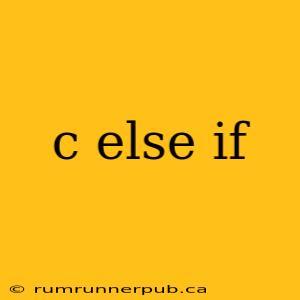The else if statement in C is a crucial control flow mechanism, allowing your program to make decisions based on multiple conditions. It's an elegant way to avoid deeply nested if-else structures, leading to cleaner, more readable code. This article will explore the else if statement in detail, drawing upon insights from Stack Overflow discussions and adding practical examples and explanations.
Understanding the Basics
The else if statement extends the functionality of a simple if statement. A basic if-else structure looks like this:
if (condition1) {
// Code to execute if condition1 is true
} else {
// Code to execute if condition1 is false
}
Adding an else if allows for checking additional conditions if the initial if condition is false:
if (condition1) {
// Code to execute if condition1 is true
} else if (condition2) {
// Code to execute if condition1 is false and condition2 is true
} else {
// Code to execute if both condition1 and condition2 are false
}
The else if block only executes if the preceding if and any previous else if conditions are false. You can chain multiple else if statements together to handle numerous possibilities.
Example: Let's write a program to determine the grade of a student based on their score:
#include <stdio.h>
int main() {
int score;
printf("Enter your score: ");
scanf("%d", &score);
if (score >= 90) {
printf("Grade: A\n");
} else if (score >= 80) {
printf("Grade: B\n");
} else if (score >= 70) {
printf("Grade: C\n");
} else if (score >= 60) {
printf("Grade: D\n");
} else {
printf("Grade: F\n");
}
return 0;
}
Addressing Common Stack Overflow Questions
Many Stack Overflow questions revolve around the correct usage and nuances of else if. Let's address some common scenarios:
Q: What happens if I have multiple else if conditions that could be true? (Inspired by numerous Stack Overflow posts regarding conditional precedence)
A: In C, the else if statements are evaluated sequentially. The first condition that evaluates to true will execute its corresponding block, and the remaining else if and else blocks will be skipped. This is crucial for designing your conditions in the correct order to achieve the desired outcome.
Example: If you have else if (x > 5) followed by else if (x > 0), and x is 10, only the first else if block will be executed.
Q: Can I use else if without an else? (Frequently asked on Stack Overflow)
A: Absolutely! The else block is optional. If the final else is omitted and none of the conditions are met, the program will simply continue execution after the else if structure.
Q: Is there a performance difference between a long chain of else if and a switch statement? (A common performance optimization question on Stack Overflow)
A: While both achieve similar results, switch statements can sometimes be optimized better by compilers, especially when dealing with integer comparisons. For simpler conditional logic, the performance difference is usually negligible. However, for complex scenarios with many conditions or range checks, a switch statement might offer a slight performance advantage.
Beyond the Basics: Nested else if and Best Practices
You can nest else if statements within other else if or if statements to create more complex decision trees. However, excessively nested structures quickly become difficult to read and maintain. It's a good practice to refactor deeply nested conditionals into functions to improve code readability and modularity. Always prioritize clarity and maintainability. Consider using early exits (returning from a function early if a condition is met) to simplify logic flow.
By understanding the fundamental principles and addressing common pitfalls illustrated by Stack Overflow questions, you can effectively leverage the else if statement to write robust and efficient C programs. Remember that clear and well-structured code is paramount for maintainability and collaboration.
